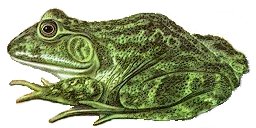Reptiles & Amphibians
An assortment of reptiles and amphibians that might be observed in and around the water. There are many other types as well. Except for a single species of frog, amphibians are absent from the marine environment.
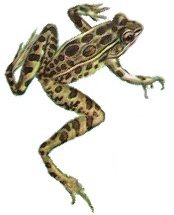
Rana utricularia
Size: to 3.5"
Habitat: in and around water
Notes: Sometimes wanders well away from water.
More: Southern Leopard Frog ...
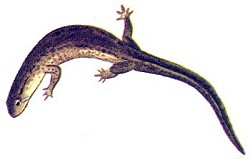
many species
Salamanders are terrestrial as adults, but eggs and larvae are aquatic. Larvae have both gill slits and external gills. A few species are completely aquatic, retaining these features as adults. Some salamanders are boldly colored and patterned and easy to identify, but many are simply small and brown and very difficult to tell apart, like this one.
More: Salamanders ...
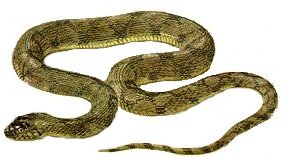
Nerodia sipedon
Size: to 42"
Habitat: in and around water
Notes: Not poisonous, but likely to bite if caught, with sharp, needle-like teeth. These snakes retreat into the water at the slightest disturbance, and are excellent swimmers, although they show no particular adaptations to it like oceanic sea snakes. Common small harmless Garter snakes are also often found around water. Most sport some variation of an attractive pattern of yellow/black stripes.
More: Northern Water Snake ...
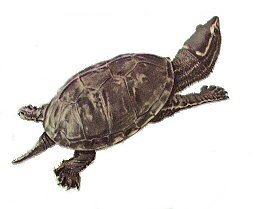
Sterotherus odoratus
Size: to 4.5"
Habitat: in and around water
Notes: Also known as 'Stinkpots'. Often bad-smelling, sometimes snappy, and a nimble climber. Occasionally, this little turtle is even found in trees.
More: Common Musk Turtle ...
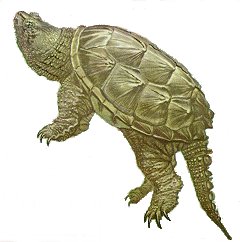
Chelydra serpentina
Size: to 15" (body)
Habitat: hides on the bottom in any type of water
Notes: Generally docile and easily approached in the water, but should be treated with respect for its powerful bite. This turtle can easily amputate a finger or toe and becomes pugnacious when landed. If you have the patience, try to see how long this turtle can go between breaths. A lot longer than you or me, that's for sure.
More: Snapping Turtle ...
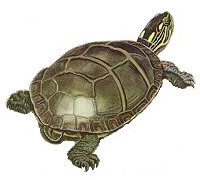
Chrysemys picta
Size: to 6"
Habitat: shallow water over muddy bottoms
Notes: Also known as 'Sliders'. Likes to sun itself on floating logs. Sliders are not native to New Jersey, but the descendants of released pets are quite common.
More: Eastern Painted Turtle ...
- Midwater Fishes ...
- Bottom Fishes ...
- Shellfish ...
- Insects ...
- Plants ...
- Reptiles & Amphibians ...
- Birds ...
- Freshwater Mammals ...
More: Freshwater ...

